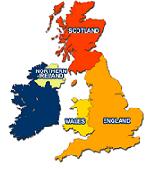UK's extradition laws
Extradition law review to consider US-UK treaty
 A review of the UK's extradition laws will consider whether the treaty with the US is "unbalanced", the home secretary has said.
A review of the UK's extradition laws will consider whether the treaty with the US is "unbalanced", the home secretary has said.
Campaigners say the agreement is biased against the UK and is being used for offences it was not intended to cover.
The review will also consider the breadth of the home secretary's discretion to intervene in cases.
It follows a series of high-profile cases, including that of computer hacker Gary McKinnon.
The Home Office says the current extradition arrangements will continue and the review will not impact on any cases currently under consideration.
The review panel will be led by a retired Law Lord and it is hoped they will have finished by the end of summer 2011.
'Interests of justice'
The review will consider the operation of the Extradition Act 2003, including the European arrest warrant, and the US/UK extradition treaty.
Home Secretary Theresa May said: "I am fully aware there are a number of areas of the UK's extradition arrangements which have attracted controversy in recent years.
"This government is committed to reviewing those arrangements to ensure they work both efficiently and in the interests of justice."
The European arrest warrant fast-tracks extradition between EU member states.
It means countries can ask for extradition of an individual without providing prima-facie evidence to the courts, usually as long as the offence is a crime in both countries and carries a prison sentence of more than one year.
Jago Russell, Fair Trials International's chief executive, said more than 1,000 people were detained and extradited by the UK in the year 2009-2010 "under Europe's no-questions-asked extradition system".
"This review, though welcome, will only produce a fairer system of extradition if it gets to grips with the problems caused by the European arrest warrant and if vital new safeguards are put in place," he said.
'Rotten system'
Critics of the US/UK treaty, agreed between Washington and London in the aftermath of the 9/11 attacks of 2001, say it is easier to extradite people from the UK than the US.
They say the arrangement is not reciprocal because the US does not need to present evidence to a British court to request extradition, while the UK still needs to present evidence to an American court.
The treaty was originally designed to make it easier to bring terrorist suspects to justice but campaigners say it is being used to seek extradition for other offences such as fraud and drug trafficking.
Conservative MP David Davis said Mr McKinnon's case and others showed "how ill thought out" some aspects of the agreements were.
"This review should also incorporate the proposed European Investigation Order which has further scope for unintended miscarriages of justice in which British citizens are penalised for actions which are not breaches of British law," he said.
Shami Chakrabarti, director of civil rights group Liberty, said Britain's "rotten extradition system" was in urgent need of an overhaul.
"No-one should be parcelled off to a foreign land without due process or when they could be dealt with here at home - people in the UK have been vulnerable to accusation and transportation across the globe for far too long," she said.
Former Home Secretary David Blunkett, who signed the treaty, has recently admitted he might have "given too much away" to the Americans.
Decision delayed
Glasgow-born Mr McKinnon, who has Asperger's syndrome, is accused of hacking into US military computer systems.
Mr McKinnon, 43, of Wood Green, north London, does not deny hacking into systems but insists he was seeking evidence of UFOs.
Both Prime Minister David Cameron and Deputy Prime Minister Nick Clegg have publicly condemned plans to extradite Mr McKinnon to the US - where he faces up to 60 years in jail.
American authorities allege that between February 2001 and March 2002, Mr McKinnon hacked into dozens of US army, navy, air force and Department of Defense computers, as well as 16 Nasa computers.
They also say Mr McKinnon altered and deleted files at a US naval air station not long after the 9/11 attacks.
In May, the home secretary agreed to an adjournment to a High Court decision on whether his extradition could go ahead.
(Published by BBC - September 8, 2010)